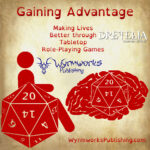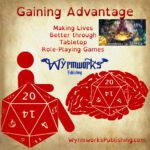How the Wyrm Worked: 2023 Retrospective

At Wyrmworks Publishing, our mission is to help you make lives better through tabletop roleplaying games. That mission inherently depends on you — we can’t do this ourselves. We — our team, our patrons, and our subscribers — the Dragon’s Hoard — worked together as a party of thousands of heroes to make lives better last year.
Here’s what we did together in a year (in roughly chronological order):
We released Limitless Heroics – Including Characters with Disabilities, Mental Illness, and Neurodivergence in Fifth Edition, the most comprehensive disability compendium ever created for a tabletop roleplaying game. Thousands of gaming groups, including both home groups and professionals like therapists, schools, specialized education programs, support groups, and a children’s theater have added this and other Wyrmworks Publishing resources to their game spaces to make them more inclusive.
Multiple libraries and game cafes have made Limitless Heroics available thanks to purchasing it themselves or through your donations. I get frequent notes from those who have added it to their game space. We love hearing about the impact it’s having!
Changing the TTRPG Industry
We were the only public voice speaking to the effect of the OGL debacle on accessibility (that I could find, and I looked). In the short time Hasbro posted its final OGL survey, that page got 27,000 visitors. I hope that some of the readers who subsequently filled out the survey form, including the hundreds who clicked through to the survey from that page, included those accessibility insights in their responses. And I hope that it in some small way added to the influence of so many others who fought for our community. More than that, I hope that it raised representation and accessibility awareness at Hasbro for future designs across their product lines. We’ll never know whether they heard us, but we’ll keep talking about it regardless.
I was asked to design a character for Azrael’s Guide to the Apocalypse, the sequel to The Adventurer’s Guide to the Bible. They included this sidebar with my character, Rodney Watts, and another disabled character who was also included:
Disability in the Afterlife
In 1 Corinthians 15:42-49, Paul briefly ponders what bodies will look like when we awaken in the spiritual realm, saying “there are heavenly bodies and earthly bodies, but the glory of the heavenly is one thing, and that of the earthly is another.” Basically, no one knows what our bodies will look like in the world to come, but it is reasonable to assume they will be an “idealized version of ourselves,” whatever that means to the individual. For many people, this likely means an end to their physical and mental disabilities.
However, our minds and bodies have a way of shaping our identity – our sense of who we are. For example, one person may feel that their reliance on a prosthetic is a hindrance, another person may feel that their prosthetic is an extension of their own body, and an integral part of their physical identity. As a result, the diversity of human bodies in the afterlife is likely to be diverse as it is in the Physical Realm, with some people choosing to be freed from aspects of their physical form that they did not like, and others choosing to embrace their disability as an eternal part of who they are. This is why some people (like Rodney or Rodriguez) may appear in this adventure with a disability, even though they have already entered the afterlife.– Heroes of the Heavenly Host, p. 41
We crowdfunded Inclusive Artwork: Fantasy Stock Art with Disability Representation for TTRPGs, the first and largest collection of fantasy stock art ever produced. When TTRPG publishers want to include disability representation in their products, the lack of available stock art to accompany it makes that cost-prohibitive, since commissioning quality art is expensive if you’re going to pay the artists fairly.
We wanted to remove that obstacle while supporting disabled, neurodivergent, and mentally ill artists.
If you missed the campaign, you can find the individual pieces or the whole discounted bundle on DriveThruRPG.
We worked with DriveThruRPG to add “Ableist” to their CCP non-discrimination template, and seven companies followed that suggestion in their agreements so far besides the one who already had.
Limitless Champions: Making Disabled Fantasy Heroes a Physical Reality
We crowdfunded Limitless Champions. We created the largest, most diverse collection of disabled fantasy minis ever made. Like stock art, very few miniatures include disability representation, and those available are mostly limited to representation through wheelchairs and canes. We expanded that range significantly, including miniatures and printable STL files, cards, accessible condition markers, and more. If you missed the campaign, you can find the collection in our shop.
We also licensed Limitless Champions characters to Fiona Shade Stories’ Adventure College Student Handbook to help make zir products more inclusive. One of those characters was featured in a recent Actual Play. If you’re interested in using our characters or other content, check out our HAG License or contact us.
In 2024, we will crowdfund Limitless Champions Adventures, a collection of adventures featuring these NPCs. To supplement those adventures, we created Limitless Champions Adventures Bonus Encounters with STLs and animated maps. They were each available free for a week or more, and they’re currently available through our Patreon.
Interviews
I love meeting the amazing people using TTRPGs to make lives better on our Gaining Advantage show. (We posted 11 episodes last year.) I also had the honor of being interviewed last year (including here a few from late 2022):
- Accessible Games
- ADHD20
- Alexandria RPG (October 2022)
- ComicBook.com
- Disabled & Dragons
- Everyone-Games Gaming and Mental Health Panel
- Invisible Not Broken
- Randomworlds
- Red Panda Publishing
- Tufts University Tabletop Club & neurodiverse students (October 2022)
- Wired.com
Community Copies
We want to make our resources available to everyone, but poverty prevents a lot of people from accessing many TTRPG resources. So to allow us to both pay our team and make our content as available as possible, we include full previews of our content on the product pages in our store. But that preview isn’t accessible or convenient for many people, so we also partner with you to make Community Copies of some of our products available. Thanks to individual Community Copy purchases, crowdfunding add-ons, and Patreon rewards, you helped us make the following free copies available:
- Limitless Heroics Coloring Book: 250
- Limitless Heroics, Full Edition: 110
- Limitless Heroics, Players Edition: 1
- Total: $5,678
We still have plenty of copies available, so go get one or more of them if you’d benefit, and please share that link with anyone else who needs one.
Specific Awareness
We released the Heart of Ice adventure for Congenital Heart Defect Awareness Week.
And for Porphyria Awareness Week, we produced a new magic item shop and raised $390 for the American Porphyria Foundation.
The Dragon’s Lair
We launched the Dragon’s Lair, a modular database of all of our publications, maps, and lots of exclusive content. It is the most affordable, accessible way to use our content. As of this writing, it has 1,704 entries.
We also launched the Wyrm’s Workshop, an opportunity for you to get your ideas published in our books! This also gave us the opportunity to hire more disabled, neurodivergent, and mentally ill freelancers. And because it costs money to pay those freelancers fairly, we developed a credits system via our Patreon to enable those without the financial means to contribute their ideas to the Wyrm’s Workshop.
Fighting for Online Accessibility
We participated in the Reddit blackout to protest for improved accessibility and helped spread the word about their discriminatory policies. When they didn’t back down, we launched an alternative to r/disabled_dungeons.
#AccessPunk
We created a new literary genre, accesspunk, with the development of the Andovir campaign world, currently in its early stages and available to patrons. Andovir was selected among 70 out of over 600 entries for Kobold Press’s Labyrinth. We created two new languages (the first of many) for Andovir to model improved cultural accessibility in a campaign world.
And we emailed 49 notes of encouragement to the Dragon’s Hoard. (A big thanks to those of you who expressed your appreciation for the encouragement. That becomes ammunition to fight my inner critic.)
I’ve also had conversations with other publishers and content creators almost every day about accessibility and representation in their products.
What’s coming in 2024?
Here’s a sampling of what we’re already working on
- We have at least two, hopefully three Kickstarters coming in 2024. The first two are currently in the playtesting and editing stages:
- Ready-to-Roll: Last minute, no prep adventures: The first in a series, get the full digital adventure for just $1! Get notified when the project launches!
- Limitless Champions Adventures: A collection of adventures featuring the characters from Limitless Champions! Get notified when the project launches!
- Expanding Andovir and explaining accesspunk in more detail
- Adding audio to existing and forthcoming projects
- VTT Adaptations (Foundry and Roll20 conversions of Limitless Heroics are nearly complete and in the bug-fixing stage), others are in the works
- Braille adaptations
- Making our products available free in Bookshare, a global library of accessible books
We have more plans in the works, which we share with our patrons.
How can you support this work?
- Sign up for the Dragon’s Hoard weekly emails. Get weekly updates, free gifts, discounts, opportunities to make a difference, and encouragement.
- Support us via Patreon. We get a chance to know each other better, you get access to all of our work, and we give away more Community Copies!
- Rate our products (and write reviews) on DriveThruRPG, your favorite podcast directory (Apple, Google, etc.), and our store.
- Rate our company on Google and Facebook.
- Leave a comment below or on any of our products or posts.
- Send us a note to share how our work has made a difference to you or people you care about.
Finally, a heartfelt thank-you. When we started this, we wondered whether anyone would agree with our intentions and resonate with our work. We wondered whether this ridiculous idea of changing the world by rolling dice and pretending together could change lives and make the world better. Hundreds of people told me it wouldn’t work, and that I should quit before I started.
And the truth is, it couldn’t. Not without you. But here you are. And here’s how far we’ve come. And we’re just getting started. And we’re not going to stop.






